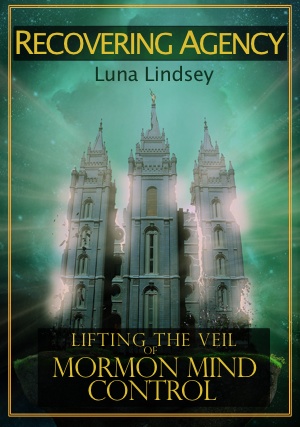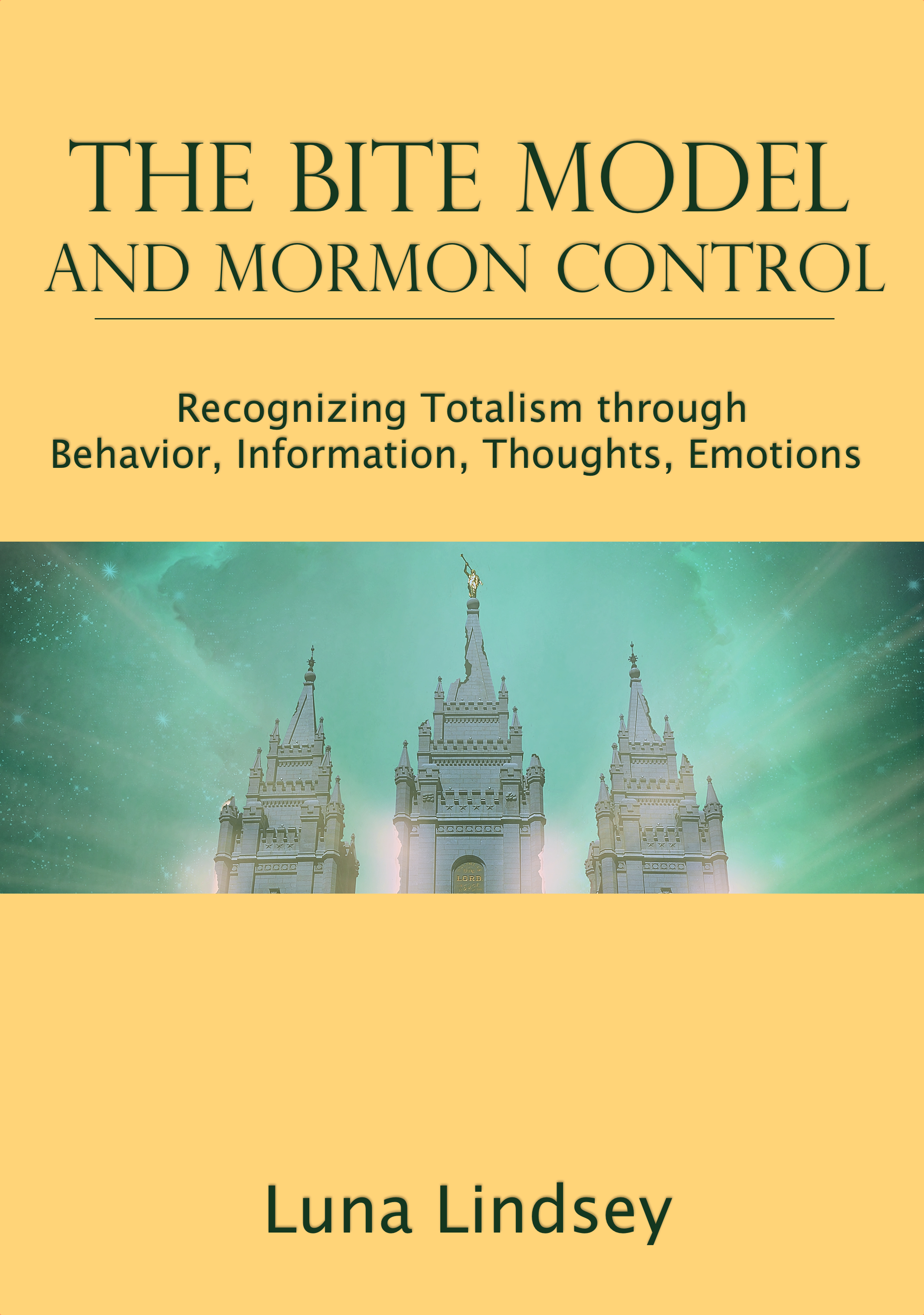[important]Frequently Asked Questions[/important]
Why did you write Recovering Agency?
I wrote Recovering Agency for Mormons and exmormons who are struggling with the psychological and emotional complexities of past or present membership in the Church of Jesus Christ of Latter-day Saints. Not all Mormons struggle, but many do.
While doing my own research into cults and mind control, I discovered frightening parallels the LDS faith and culture that help to explain the high rates of depression and suicide un Utah and among Mormons, toxic perfectionism and shame, eating disorders, sexual abuse cover-ups, unaddressed domestic and child abuse, unrighteous dominion from leadership, and the codependent passive-aggressive culture that permeates Utah and LDS families.
Again, not every Mormon has this experience, but too many do. I wrote Recovering Agency to help them.
Additionally, many happy Mormons cannot fathom why some members are disaffected. They may tend to judge and blame those who are unable to keep up appearances of happiness, health, and perfection. For these Mormons, Recovering Agency should bring compassion and better understanding of issues that might otherwise be invisible.
For those outside the Church, I wrote this book to reveal the psychological aspects of a unique and important American religion, and to bring to light in general how the potential for coercive persuasion exists in all groups. By using examples from a specific high-demand group, I hope to show how easily anyone can be influenced to such a high degree. By seeing how it’s done, I hope my readers can recognize it and avoid it in their own lives, no matter what groups they encounter or belong to.
What is mind control?
The short answer is that it’s a system of influence that persuades an individual to trust completely in another individual or a group, which suppresses critical thinking stills, creates social or psychological dependency, and isolates that person from doubt-inducing information.
The longer answer is here: What is Mind Control?
And an even more detailed answer can be found in the pages of Recovering Agency.
How many Mormons does it take to change a lightbulb?
Seven. One to give opening prayer, one to say closing prayer, one to lead the music, one to play piano, one to give a lesson, one to serve refreshments, and one to change the bulb.
Why do you hate Mormons?
I don’t!
It is possible to criticize an organization, its doctrines, its culture, its policies, and its leadership, without criticizing the individuals who make up that group. It is a complete and complex system which influences individuals to act. Most individual Mormons are doing the best they can, and doing the things they believe are right, following their sincere convictions, and trusting in their leaders. They have good reasons to do so. I don’t blame them – I was one of them myself, once.
It is also possible to criticize an organization without hating that organization. The LDS Church has many problems, for sure, but I’m not required to hate it to speak about those problems, just as I point out the many problems with the US government even though I still love my country. Just as I can point out the errors in my childrens’ behavior without hating them.
Open discussion requires the ability to discuss problems and flaws when we see them. LDS doctrine teaches that those who speak against it are hateful, angry, selfish, and alot of other pretty terrible things. This is one of the mind control techniques I write about in Recovering Agency. The goal of this tactic is to stifle thought and free discussion by vilifying anyone who might call attention to the flaws within Mormonism. If faithful Mormons think I hate them or the Church, they will refuse to listen to me.
Nevertheless, the flaws will still be there, even if no one listens. Even if they choose to avert their eyes from those dark corners of their beloved faith.
Is Recovering Agency based on a bunch of lies?
The LDS Church teaches that anyone criticizing the gospel or its leaders is a liar. They call people like me “anti-Mormon” and ascribe to us all kinds of motives which are almost always untrue.
Because I was raised with these beliefs myself, I anticipated that people would accusing me of lying. For this reason, I made extra sure to back up all my claims with sources, facts, and sound reasoning.
All the LDS quotes in Recovering Agency are real. I took most of them from the LDS.org website, except for those which the Church has tried to cover up, those that are too old to remain in their 30-year archive of documents, or those quotes that were made through unofficial LDS channels, like at major media outlets. These sources I have also cited, and are available for independent verification.
All of my claims about how mind control works are based on the work of social psychologists and other types of researchers who were studying other groups besides Mormonism and who have studied how all humans respond to influence and social pressures.
Many experiments have revealed much about things like how most people react to authority, what people do when everyone around them insists on giving a wrong answer, and what it takes to change a person’s opinion or keep them from changing it. I discuss these experiments and what they tell us about the LDS system of thought.
And many high-demand groups (cults) exist in the world – some as small as families, others as large as nations. Researchers have studied these groups by infiltrating them or by questioning those who leave. I cite these researchers and the conclusions they have formed. I also directly quote people who have left such groups, and their descriptions of what it was like.
In spite of the monumental effort I put in to maintaining the intellectual integrity of my work, I may have made a few mistakes. It is possible my due diligence was not enough and I have presented unfactual information. Or the conclusions I’ve made based on that information may be incorrect. I am just a person; I am not a prophet nor are my words infallible. I welcome reasonable and rational critique and debate.
Because I have cited all my sources and included so many direct quotes, the reader can make up her own mind about whether my case is convincing. Unlike the Church, I do not discourage my readers from doing their own research and perusing other sources and even opposing opinions. In fact, I encourage it. Such is required for free and open thought.
What religion do you belong to now?
I don’t. I belong to no other organized religion, and I do not believe there is a God.
I am, however, a spiritual person. I believe the human mind is capable of finding meaning in all kinds of places, and this is a beautiful miracle all on its own.
Most of the universe is outside the grasp of the human mind, our senses, our ability to measure with machines. This means that scientific reasoning, as accurate as it can be, doesn’t have a full grasp on “what’s out there.” Nor can modern science satisfy with answers about what it all means.
But that also implies no one else has those answers, either. I am not religious because I am highly distrustful of anyone who claims they know how it works, especially when they want to apply those answers to me.
I have had spiritual experiences. They might have been supernatural forces at work, or might have been tricks of my own mind. In either case, I have found meaning in them, and that’s what’s important. I’ve also read spiritual works from many religious traditions, and found meaning there. Moreover, I have found meaning in the study of nature, via science, which brings me so many reasons to be awestruck by this wonderful universe we live in. Whether it was or was not made by a God makes no difference to how beautiful and wondrous it is.
Any meaning I find in life is special and sacred to me. It’s not my place to presume those answers were meant for anyone else. I will share those answers to those willing to hear, but I will not try to convert anyone to them no more than I’d try to make anyone else wear size 7 shoes.
It is up to each person to find meaning for themselves. For some, that means believing in God, or joining a religious group to share with like-minded people. In my case, it means walking alone, which is just fine, too.
In no case, do I believe it is moral or just to use pressure, coercion, or manipulation to apply spiritual answers to anyone else. The meanings we find are meant to serve us, not the other way around. If we force people into slavery to an ideology that does not fit, then we’ve got it all backwards, and our humanity is stripped away.



